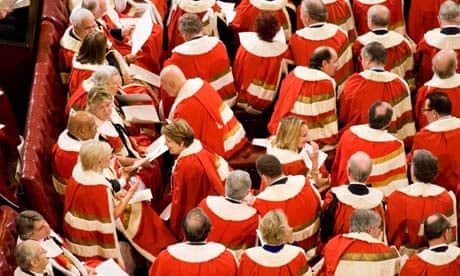David Cameron may "unwittingly destroy" the House of Lords because the rate of new peers appointed to the upper chamber is threatening its ability to do its job.
The warning on the volume of House of Lords appointments and their impact on a functional parliament has been raised in a report by the independent Constitution Unit (pdf) at University College London.
The unit's report – entitled House Full – details "huge concern" among peers about the negative effects of the surge in numbers as a result of "almost wholly unregulated appointments by the prime minister".
Cameron has created more peers more quickly since moving into No 10 than any of his postwar predecessors, having ennobled 117 people in under a year.
The figure is around one-third of the number appointed by Tony Blair during his 11 years in power.
The Lords now has 792 members who are entitled to attend and vote, rising to 831 once those temporarily excluded are counted.
In 1999, after the House of Lords Act was passed, there were 666 members, down from 1,330 following the departure of the majority of hereditary peers.
The new report – written with the support of 18 senior parliamentarians and independent experts – said the arrival of so many new peers in such a short space of time has had a "negative impact" on the culture of the upper chamber which, in the past, has seen new members added more gradually and "socialised" in the chamber's practices and conventions.
It warned that the Lords is now overcrowded, with members competing for seats in the chamber and office space outside, creating a "fractious" atmosphere because many peers feel frustrated at their inability to take part in debates.
The report said the rapid influx of new peers – many of them former MPs – has had a negative impact on the Lords' non-partisan ethos and courteous atmosphere.
It warned that any further increase "risks the House being unable to do its job", saying: "Should further appointments follow, the culture, practices and effectiveness of the House of Lords would be greatly at risk."
A draft Lords reform bill is expected shortly after 5 May, but it is likely to take four years before reform happens if the legislation makes its way through parliament.
The report called for an "immediate moratorium" on appointments, to be lifted only when the figure falls below 750.
After that, it said there should be a controlled system for new appointments, with each batch of new peers appointed in proportion to votes at the last general election, for example. It also called for peers to be allowed to retire.
"In preparation for the time when the number of eligible members falls below 750, future appointments must be put on a more justifiable, more transparent and sustainable basis," it noted.
The Constitution Unit deputy director, Meg Russell, said: "It is unusual for a group of such senior figures to come together on a cross-party basis to call for change, but there is huge concern in the House of Lords about this issue.
"The fear is that David Cameron may unwittingly destroy the Lords through this volume of appointments.
"We await Lords reform, but in the meantime we must maintain a functional parliament.
"The risk is that reform fails – as it often has before – but that, meanwhile, the Lords has become bloated and dysfunctional."
There is particular concern over numbers given that one of the coalition's objectives is to achieve proportionality between parties in the Lords in relation to the general election result.
Delivering this promise would effectively require the upper chamber to swell to at least 1,062, according to the report.
However, the document notes that the rise under Cameron's tenure is not all down to achieving this aim, as 39 new peers have been added since May 2010.
The report said resignation honours lists, made by a departing prime minister, and dissolution honours lists at the end of each parliament – whereby peerages are given to retiring or defeated MPs – can no longer be sustained in a chamber with limited space and a target of proportionality.
Figures for this month show the upper chamber is made up of 243 Labour peers, four of whom are hereditary, 218 Conservatives, 48 of whom are hereditary, and 93 Liberal Democrats, four of whom are hereditary, alongside a further 184 Lords serving as crossbenchers, with 25 bishops and 29 listed as "other" making up the total.
Responding to the report, a cabinet office spokesman said: "The government will be bringing forward a draft bill before the end of May proposing a wholly or mainly elected House of Lords."
The UCL report is endorsed by: Lord Butler, the former cabinet secretary; Lady Boothroyd, the former Speaker; Lady De Souza, the convenor of the independent crossbenchers; Lady Jay, the former Labour leader of the Lords; Lord Steel of Aikwood, the former Liberal leader; Lord Woolf, the former Master of the Rolls; Lord Adonis, the former Labour cabinet minister; and Lord Forsyth and Lord Mackay of Clashfern – both former Tory cabinet ministers.
